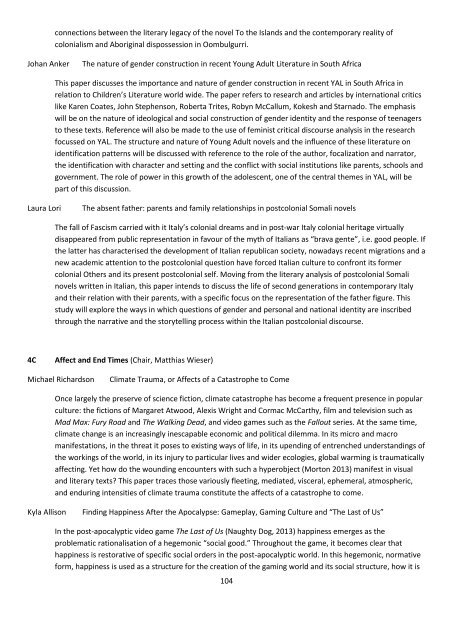Crossroads in Cultural Studies Conference 14-17th December 2016 Program Index
Crossroads-2016-final-draft-program-30-Nov
Crossroads-2016-final-draft-program-30-Nov
Create successful ePaper yourself
Turn your PDF publications into a flip-book with our unique Google optimized e-Paper software.
connections between the literary legacy of the novel To the Islands and the contemporary reality of<br />
colonialism and Aborig<strong>in</strong>al dispossession <strong>in</strong> Oombulgurri.<br />
Johan Anker<br />
The nature of gender construction <strong>in</strong> recent Young Adult Literature <strong>in</strong> South Africa<br />
This paper discusses the importance and nature of gender construction <strong>in</strong> recent YAL <strong>in</strong> South Africa <strong>in</strong><br />
relation to Children’s Literature world wide. The paper refers to research and articles by <strong>in</strong>ternational critics<br />
like Karen Coates, John Stephenson, Roberta Trites, Robyn McCallum, Kokesh and Starnado. The emphasis<br />
will be on the nature of ideological and social construction of gender identity and the response of teenagers<br />
to these texts. Reference will also be made to the use of fem<strong>in</strong>ist critical discourse analysis <strong>in</strong> the research<br />
focussed on YAL. The structure and nature of Young Adult novels and the <strong>in</strong>fluence of these literature on<br />
identification patterns will be discussed with reference to the role of the author, focalization and narrator,<br />
the identification with character and sett<strong>in</strong>g and the conflict with social <strong>in</strong>stitutions like parents, schools and<br />
government. The role of power <strong>in</strong> this growth of the adolescent, one of the central themes <strong>in</strong> YAL, will be<br />
part of this discussion.<br />
Laura Lori<br />
The absent father: parents and family relationships <strong>in</strong> postcolonial Somali novels<br />
The fall of Fascism carried with it Italy’s colonial dreams and <strong>in</strong> post-war Italy colonial heritage virtually<br />
disappeared from public representation <strong>in</strong> favour of the myth of Italians as “brava gente”, i.e. good people. If<br />
the latter has characterised the development of Italian republican society, nowadays recent migrations and a<br />
new academic attention to the postcolonial question have forced Italian culture to confront its former<br />
colonial Others and its present postcolonial self. Mov<strong>in</strong>g from the literary analysis of postcolonial Somali<br />
novels written <strong>in</strong> Italian, this paper <strong>in</strong>tends to discuss the life of second generations <strong>in</strong> contemporary Italy<br />
and their relation with their parents, with a specific focus on the representation of the father figure. This<br />
study will explore the ways <strong>in</strong> which questions of gender and personal and national identity are <strong>in</strong>scribed<br />
through the narrative and the storytell<strong>in</strong>g process with<strong>in</strong> the Italian postcolonial discourse.<br />
4C<br />
Affect and End Times (Chair, Matthias Wieser)<br />
Michael Richardson<br />
Climate Trauma, or Affects of a Catastrophe to Come<br />
Once largely the preserve of science fiction, climate catastrophe has become a frequent presence <strong>in</strong> popular<br />
culture: the fictions of Margaret Atwood, Alexis Wright and Cormac McCarthy, film and television such as<br />
Mad Max: Fury Road and The Walk<strong>in</strong>g Dead, and video games such as the Fallout series. At the same time,<br />
climate change is an <strong>in</strong>creas<strong>in</strong>gly <strong>in</strong>escapable economic and political dilemma. In its micro and macro<br />
manifestations, <strong>in</strong> the threat it poses to exist<strong>in</strong>g ways of life, <strong>in</strong> its upend<strong>in</strong>g of entrenched understand<strong>in</strong>gs of<br />
the work<strong>in</strong>gs of the world, <strong>in</strong> its <strong>in</strong>jury to particular lives and wider ecologies, global warm<strong>in</strong>g is traumatically<br />
affect<strong>in</strong>g. Yet how do the wound<strong>in</strong>g encounters with such a hyperobject (Morton 2013) manifest <strong>in</strong> visual<br />
and literary texts? This paper traces those variously fleet<strong>in</strong>g, mediated, visceral, ephemeral, atmospheric,<br />
and endur<strong>in</strong>g <strong>in</strong>tensities of climate trauma constitute the affects of a catastrophe to come.<br />
Kyla Allison<br />
F<strong>in</strong>d<strong>in</strong>g Happ<strong>in</strong>ess After the Apocalypse: Gameplay, Gam<strong>in</strong>g Culture and “The Last of Us”<br />
In the post-apocalyptic video game The Last of Us (Naughty Dog, 2013) happ<strong>in</strong>ess emerges as the<br />
problematic rationalisation of a hegemonic “social good.” Throughout the game, it becomes clear that<br />
happ<strong>in</strong>ess is restorative of specific social orders <strong>in</strong> the post-apocalyptic world. In this hegemonic, normative<br />
form, happ<strong>in</strong>ess is used as a structure for the creation of the gam<strong>in</strong>g world and its social structure, how it is<br />
104


